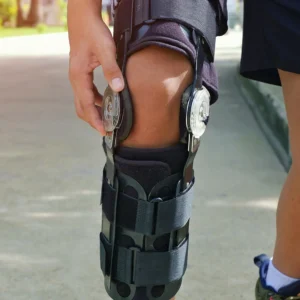Meniscus Transplant
If you need a meniscus transplant, please Schedule an appointment with one of our orthopedic specialists as soon as possible.
What Is A Meniscus Transplant?
 In meniscal allograft transplantation, surgeons replace a damaged or removed meniscus in the knee with a donor meniscus from a cadaver. The meniscus, a C-shaped cartilage between the thigh bone (femur) and shin bone (tibia) within the knee joint, acts as a shock absorber and provides stability. This procedure is considered for individuals with significant meniscus damage or those who have had a total or subtotal meniscectomy. Its goal is to restore knee joint function and stability, alleviate pain, and potentially prevent or delay knee osteoarthritis development.
In meniscal allograft transplantation, surgeons replace a damaged or removed meniscus in the knee with a donor meniscus from a cadaver. The meniscus, a C-shaped cartilage between the thigh bone (femur) and shin bone (tibia) within the knee joint, acts as a shock absorber and provides stability. This procedure is considered for individuals with significant meniscus damage or those who have had a total or subtotal meniscectomy. Its goal is to restore knee joint function and stability, alleviate pain, and potentially prevent or delay knee osteoarthritis development.
Procedure
The transplantation uses a donor meniscus sourced from a cadaver through a thoroughly screened and regulated process. The donor tissue undergoes processing and sterilization to reduce the risk of disease transmission. Surgeons perform the transplantation using arthroscopic techniques, making small incisions and employing specialized instruments to access the knee joint. They remove the damaged or missing meniscus and insert the donor meniscus, appropriately sized, into the joint. The new meniscus is then secured to the surrounding tissues using sutures or other fixation methods.
Rehabilitation
After meniscus transplantation, a comprehensive rehabilitation program becomes crucial for achieving optimal outcomes. The rehabilitation process usually entails gradually advancing exercises to regain knee joint range of motion, strength, and stability. Weight-bearing and activity restrictions are typically imposed during the initial recovery phases.
Meniscus transplantation offers potential benefits such as pain relief, improved knee function, and potential delay of osteoarthritis onset. It can enable individuals to resume more active lifestyles and engage in sports or activities previously limited by meniscus damage. However, this complex procedure isn’t suitable for everyone with meniscus injuries or previous meniscectomies. The decision to undergo transplantation hinges on factors like age, overall knee condition, activity level, and the severity and location of the meniscus damage.
It’s important to consult with an orthopedic surgeon who specializes in knee surgery to determine if meniscus transplantation is a suitable option for your specific case. They will evaluate your condition, discuss the potential risks and benefits, and provide personalized recommendations based on your individual needs and goals.

